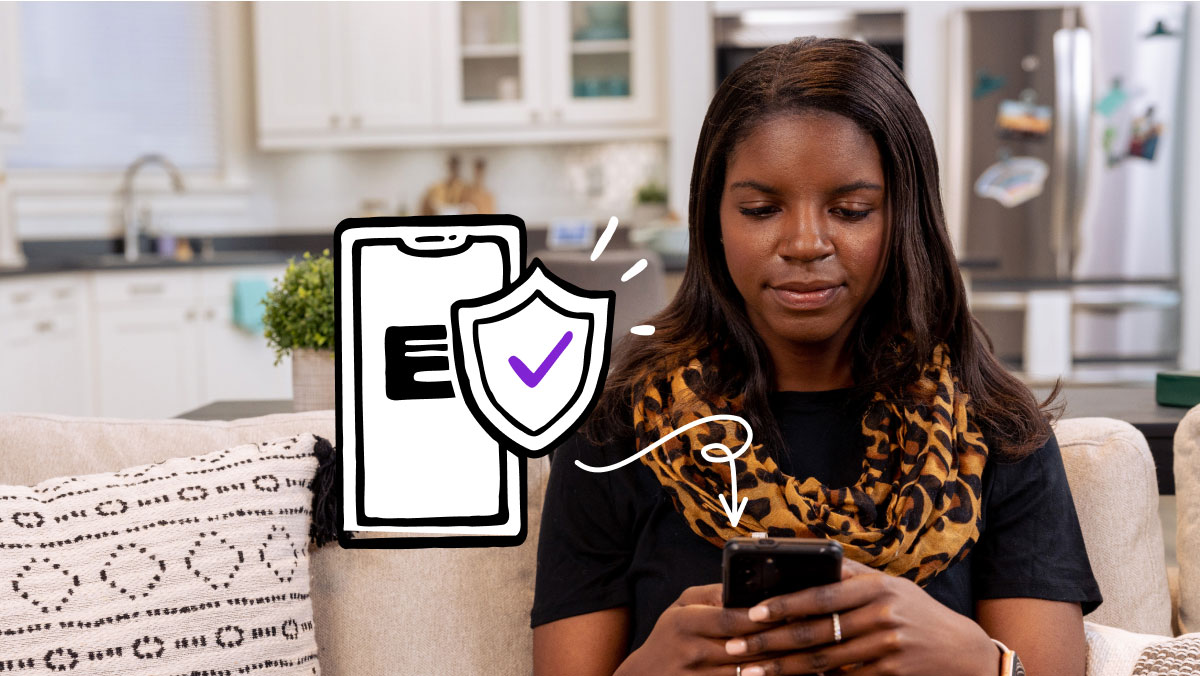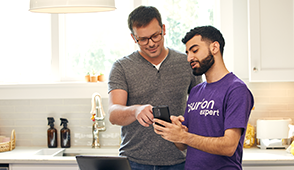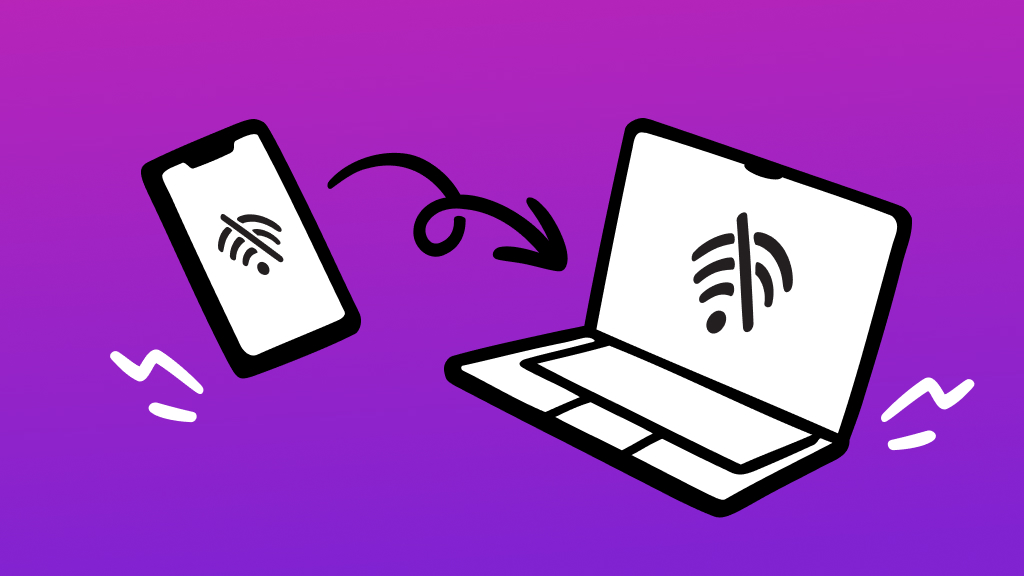For many of us, our phones are our lifeline, keeping track of everything from our whereabouts to our bank information. We give a lot of thought to all of our mobile devices fun features and how much easier they can make our lives, but have you given much thought lately to how secure your information is? We hate to be the bearer of bad news, but thieves and hackers probably have.
Knowing what to do if your phone is lost or stolen is important, especially considering that Asurion claims data shows it happens to more than 1,000 cell phones every single hour but protecting your device from potential phishing attempts should also be taken seriously. Asurion Experts help our 300 million customers diagnose and resolve their device problems, and know how to avoid security risks.
Here are their top 10 security suggestions to protect your personal data, keep your smartphone safe and give you peace of mind.
1. Create a strong passcode for your phone
First and foremost, make sure that you have an extra layer of protection added to your phone to keep it safe and enable a screen lock. That way, if you do lose your phone, someone won't be able to open it easily.
3 tips for creating a strong passcode:
- Think of numbers as letters to help you create a passcode that is challenging, but something that will be memorable for you. For example, if you're a foodie you might use CAKE (2253) or LATTES (528837). A six-digit passcode, although more work, is more secure than a four-digit one.
- Avoid obvious number combinations like 1-2-3-4 or repetitive codes like 1-1-1-1.
- Don't use numbers that can be easily guessed like your birth date, anniversary, your phone number, etc.
If you want additional protection, make sure to enable biometric authentication like facial recognition or finger mapping. Changing your passcode is relatively easy on both iPhone and Android devices, so it'd be smart to make it a habit to change it on a recurring basis. Also, if you ever notice strange behavior on your phone, change your password first as a precautionary measure.
2. Use a different password for each of your online accounts
Having the same password for everything makes you an easy target for thieves and hackers to steal your information. It sounds complicated to try to keep track of a bunch of different passwords, but thankfully, there are password manager apps that can help keep track of them for you. Many of them can also help create strong passwords with built-in password generators. Check out our guide to the best password managers for more info.
Don't store your passwords in an unprotected app or file, and don't list them out in an email or your Notes app. If someone were to access your device, email address, or phone number, they'd suddenly have your passwords and could change most of them immediately.
3. Be smart about the information you keep on your phone
If your phone ever lands in the wrong hands, they have an open invitation to access whatever you've stored on your device. Keep yourself, and your phone safe, by storing your most personal information in a safe place, and not on your smartphone. Information like your social security number, banking details, driver's license, or passport number simply belongs in a safer space.

Tech help at your fingertips
Get your tech questions answered now with our live expert support.
4. Avoid using public Wi-Fi
In the confines of your own home, your private network is usually secure. When you're on an unsecured Wi-Fi network, however, all bets are off. If you use a public Wi-Fi network, you open yourself up to snooping from anyone in the vicinity. If you need to use a public connection (and we all often find ourselves in this situation), use it wisely. Don't access personal details like online banking, digital wallets or payment apps. For example, if you decide to online shop while you're working at a coffee shop, a phone hacker could lift your credit card details if you're connected to a public wireless network. Check out our 6 tips for safely using public Wi-Fi.
You can also turn off Wi-Fi auto-connect and Bluetooth® if you're not using them. And finally, turn off your personal Wi-Fi hotspot when you're not using it; password protect it when you are.
5. Don’t use the auto sign-in feature
We know it's incredibly tempting to use auto sign-in on social media accounts because of its convenience, but it opens you up to a whole lot of security issues. If that information ever ended up in the wrong hands, you'll be out a whole lot more than just your phone.
6. Keep your accounts separate
As tempting as it may be to use your Facebook or Google account to sign in to websites, apps and social media platforms, we wouldn't recommend it. Linking sites together through single sign-on can be a risky adventure. A hacker would only need to access one account to hack them all. The easiest way to avoid this is to create separate accounts or disconnect any apps that are linked together.
7. Download apps and games securely
Downloading smartphone apps or games from the App Store or Google Play store is safe, but be wary of downloading anything that doesn't come from a secure website or certified app store. Secure websites usually have a padlock icon to the left of the URL in the address bar.
It's also a good idea to use two-factor authentication on your apps. Also called 'two-step" and 'verification," two-factor authentication offers an extra layer of security by requiring you to provide two pieces of information to log in: your password and a verification code that's either texted to your phone number or emailed to one of your trusted devices. This way, even if someone steals your password, they can't log in.
8. Be wary of strange attachments and links
Do not click, follow, or download any links or attachments without being sure of the sender's intentions. Clicking a suspicious link can lead you to a website that will automatically download an app, file, or program that could compromise your device.
Hackers also have the ability to text you from a friend's number or send you an email from the address of someone you know. If you receive a message asking an odd favor or offering an unrequested gift, it could be a trick from a hacker. Contact the sender for an explanation before following any links or downloading any attachments.
9. Turn on find my phone features
It almost goes without saying, but if you leave your phone out in public or lose it, someone can potentially hack your security code to unlock the device. If you have your phone's native find my phone option enabled, you can not only track your phone's location, but also remotely lock and erase your data to protect your privacy.
On Android phones: Open Settings > Security and privacy > Find My Mobile, then toggle on Allow this phone to be found. (Note: Depending on your device, Security and privacy may simply be called Security).
On iPhones:
Open Settings > {Your Name} > Find My > Find My iPhone, then turn the feature on.
10. Update your software
Software updates aren't just about adding new features or improving performance; they play a vital role in your security updates. When you update your software, you're not only getting access to the latest enhancements but also vital security patches. These patches fix vulnerabilities that hackers could exploit to gain unauthorized access to your system or personal information. By staying up-to-date, you're strengthening your defenses against malicious software and cyber threats.
Tried these steps and still need help? We got you. Get your tech problem solved when you call or chat with an expert now.






